I am a 92-year-old competitive dragon-boat paddler living with my partner Anne Clark, 81, in a retirement community with a view of the Willamette River in Portland, Oregon. Anne and I are members of the Portland Golden Dragons paddling team that practices on the river three mornings a week and competes in national and international races. We are all old guys and gals, although some of the “old people” on our team are younger than my children. We are all over 50.
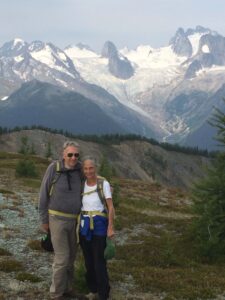
Helihiking in Canadian Rockies’ Bugaboos – 2015
We practice year-round. Yes, it can be cold and wet when the temperature is in the mid-30s and it is raining hard. But as we paddlers like to say, “There is no such thing as bad weather, only inappropriate clothing.” We dress for the weather and we take a day off on the rare occasions when the temperature drops below freezing.
I moved to this retirement community, called Mirabella Portland, 14 years ago because my wife, Fran Spigai, had Alzheimer’s disease and we needed to be in a community that would help me take care of her. I was able to keep Fran with me in an independent living apartment much longer than I would have been able to care for her anywhere else, even though she no longer recognized who I was, despite several decades of happy marriage.
We first met Anne when she and her husband, Chris Clark, a neurologist, were exploring the possibility of moving to Mirabella. Mirabella marketing staff suggested we host them for dinner to answer their questions about our community. We liked them both enough to stay in touch. Anne later moved into Mirabella alone shortly after her husband died of cancer. Anne helped me take care of Fran, including being a relief caregiver to give me a break from 24×7 caregiving a couple of times a week to play competitive duplicate bridge.
During the later stages of Fran’s disease when caregiving became particularly stressful, a platonic email “pen pal” relationship with Anne gave me a vicarious lifeline link to normalcy from the world of dementia I was living in. When my full-time caregiving job ended, Anne and I continued our conversations in person.
I told Anne that what I most needed was physical exercise. Anne, who was already a member of the Golden Dragons, suggested that I come paddling with her. The rest is history. I loved paddling. Anne and I continued our conversations in person, enjoyed each other’s company and fell in love. We have been paddling together for nine years and living together for eight.
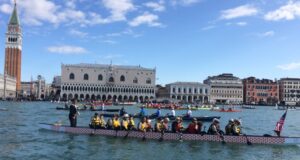
Golden Dragons in Grand Canal in Venice – Ed & Anne in back row 2016
Dragon boat paddling is a team sport. There are usually 20 paddlers (10 on each side) who need to keep in perfect time under the direction of a “caller” who gives commands and a “tiller” who steers the boat. It is not like rowing. Paddlers love to say that rowers do it backwards, while paddlers know where they are going.
Racing dragon boats are lightweight fiberglass boats with dragon scales painted on the outside. In Portland, the boats, owned by Dragon Sports USA, are docked at the River Place Marina and rented to several different Portland clubs. The Golden Dragons use them Monday, Wednesday and Friday between 9 and 10 a.m.
Portland also has several heavy (1,500 pound) ceremonial dragon boats with large heads and tails, a gift from the City of Kaohsiung in Taiwan, a sister city of Portland. Those boats are used for Portland’s annual Rose Festival dragon boat races in early June. When they are brought out of storage each spring, the dragons’ eyes are painted open in a formal Buddhist ceremony. The eyes are painted shut when they go back into storage after the Rose Festival.
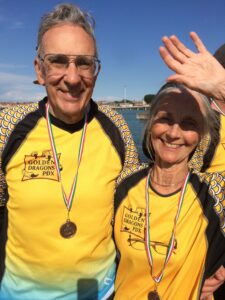
Ed & Anne with racing medals
Anne and I have competed with the Portland Golden Dragons in races elsewhere in Oregon and Washington, in Arizona and in Venice, Italy. Anne has also competed in races in San Diego and in France. Paddling is a full body sport. We push with our legs and use our entire core to move the paddle. Our shoulders are locked into our core and our arms only guide the paddle as our core strength moves the boat. Using only arm and shoulder muscles to move the paddle is a recipe for shoulder injuries.
To build core strength in preparation for a race several years ago, Anne and I started working with a personal trainer at the Oregon Health and Science University gym. Our exercise regimen continues to include twice a week strength-training routines at the gym. Despite our ages, we are still getting stronger. If we come close to mastering anything, our trainer switches us to harder exercises or adds more weight.
After the races in Venice, Anne and I paddled with the rest of our team in the annual Vogalonga, an event that started in the 1970s as a protest against motorized vessels in the Venice canals. For half a day each year, canals are closed to motorized vessels, which shuts down the city’s public transportation system. Instead, thousands of human-powered vessels of every imaginable type follow a parade loop of about 25 miles starting and ending at St. Peter’s Basilica at the head of the Venice Grand Canal.
Most of our races are not restricted by age categories. In a dragon boat festival in 2022 in Tempe, Arizona, we competed against college teams. We didn’t win but we were respectable competitors. At 90, I was the oldest paddler in the festival. I had my picture taken with the youngest paddler, who was age 10.
In 2021, on a vacation trip to France, Anne and I paddled in a practice session on Lake Annecy in the French Alps with a French dragon boat team Anne had competed against in races in Annecy before we got together.
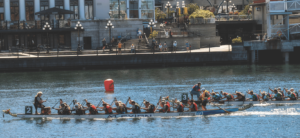
Golden Dragon Boat finishing first in race in Victoria harbor
In December 2023 Anne and I went on a Stanford alumni trip to Costa Rica. The two event options for the last day (after about 10 days of ocean water sports, ziplining over jungle canopy and hiking in rain and cloud forests), were urban shopping or white-water rafting. Anne and I signed up for white-water rafting. A week before the trip, the Stanford organizers told us the white-water rafting contractor was not going to let us paddle because we were too old.
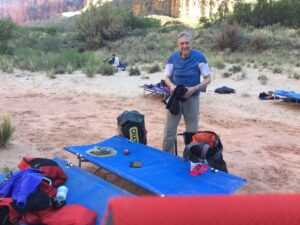
Ed at campsite 9-day rafting trip through Grand Canyon 2017
I filed an age discrimination protest with Stanford and included a link to a magazine article with a picture of Anne and me in our paddling clothes and holding our paddles. The story was about paddling on the Golden Dragons race team and winning a gold medal in an international competition in Victoria, Canada, earlier that year. I also mentioned that when I was in my 80s and Anne in her 70s, we had rafted down the Colorado River through the Grand Canyon. Stanford got the contractor to reverse the discriminatory decision.
We had a great time paddling with a guide and a fellow Stanford traveler in a small Zodiac boat through class three rapids in a river in Costa Rica. Now we are back to dragon boating and will compete again in races in Victoria in August this year. We plan to happily paddle through life together for as long as we can.

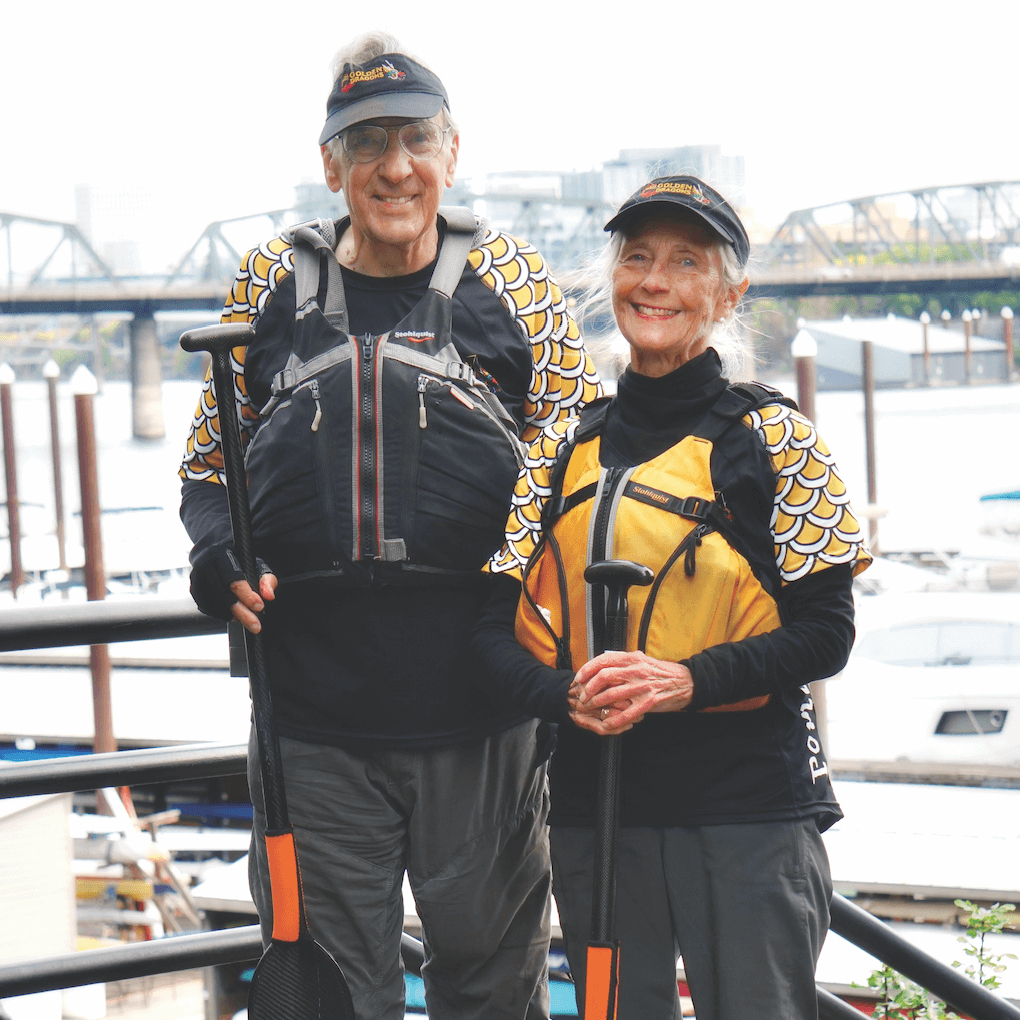
Inspirational story
I really, really enjoyed reading this story. Ed Parker is clearly an adventurous, open, and kind person. I only wish I have the stamina and intention he clearly demonstrates at his age. Way to go! Clearly enjoying life.
Rita
Thanks for being such an inspiration to all of us. Cathy W.
I really enjoyed the article. It spoke to me in many ways. First, how delightful it is that a person can get on with life after losing a beloved spouse. Too many people wind up sad and alone when they still have a lot of life left in them. I also liked how you fought ageism and won. I was particularly tickled by the dragon’s eyes being painted open for the event and painted closed when they are put away. What a cool concept!
Just WOW!!!!
A strong story from a strong and inspirational person/couple. Thanks for all the details and the photos. This is a memorable time for you and Anne. Your enthusiasm for life and experiences is contagious (in a good way). Your last sentence set the tone for your years to come — “We plan to happily paddle through life together for as long as we can.”
How exciting!!! I would love to join you in dragon boating. I m working on a move to the Portland area, If you are open to sharing your experiences at Mirabella, feel free to contact me. Thanks and happy boating. 🚣
Hey people!!!!!
Good mood and good luck to everyone!!!!!